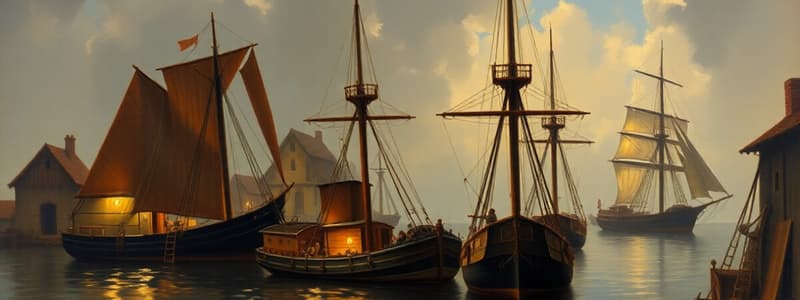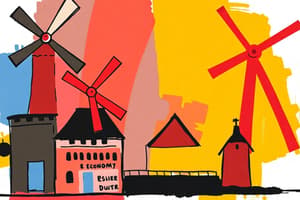Podcast
Questions and Answers
What led to the prosperity of the city-states in the Italian Peninsula?
What led to the prosperity of the city-states in the Italian Peninsula?
- Expansion of commerce (correct)
- Increased warfare
- Decline of agriculture
- Limited trade routes
What event caused a small economic recession in the Italian city-states?
What event caused a small economic recession in the Italian city-states?
- Formation of the Roman Empire
- Black Death (correct)
- Renaissance
- Crusades
What industry did Florence focus on after rebounding from economic decline?
What industry did Florence focus on after rebounding from economic decline?
- Textile production (correct)
- Mining
- Shipbuilding
- Banking
What was the primary function of the Bank of Amsterdam when it was founded?
What was the primary function of the Bank of Amsterdam when it was founded?
In the early 1600s, how did the Dutch Republic manage its agricultural surplus?
In the early 1600s, how did the Dutch Republic manage its agricultural surplus?
Which company was founded in 1402 as part of the Dutch economic expansion?
Which company was founded in 1402 as part of the Dutch economic expansion?
What was a notable feature of the Dutch economy in the 1400s?
What was a notable feature of the Dutch economy in the 1400s?
What happened to the Dutch economy's commercial fleet from 1450 to 1600?
What happened to the Dutch economy's commercial fleet from 1450 to 1600?
Flashcards
City-States of the Italian Peninsula
City-States of the Italian Peninsula
The city-states of the Italian Peninsula were a unique form of governance where independent cities controlled their territories and affairs rather than being subject to a larger kingdom or empire.
Thriving Economies in City-States
Thriving Economies in City-States
The economy of the Italian city-states thrived due to their strategic location on the Mediterranean Sea, which facilitated trade across Europe, Asia, and North Africa. This trade brought wealth and prosperity to the cities.
The Bank of Amsterdam
The Bank of Amsterdam
The Bank of Amsterdam, established in 1609, played a crucial role in facilitating trade by providing a safe and reliable system for payments and credit to merchants involved in international commerce.
Expansion of the Dutch Republic
Expansion of the Dutch Republic
Signup and view all the flashcards
Canal Network of the Dutch Republic
Canal Network of the Dutch Republic
Signup and view all the flashcards
Rapid Growth of the Dutch Economy
Rapid Growth of the Dutch Economy
Signup and view all the flashcards
The Dutch East India Company
The Dutch East India Company
Signup and view all the flashcards
Dutch Traders as Middlemen
Dutch Traders as Middlemen
Signup and view all the flashcards
Study Notes
The Dutch Republic's Economic Growth
- The Bank of Amsterdam facilitated trade and encouraged payments in Amsterdam's bills.
- Dutch merchants specialized as middlemen, having a large merchant fleet of 93x by 1600-1450.
- Shipbuilding and windmill-powered sawmills contributed significantly.
- Herring trade generated substantial revenue, estimated at 200 million per year.
- Dutch East India Co. founded in 1602.
- Investment in commerce and manufacturing fueled economic growth.
- Population growth led to a densely populated area by 1645.
- Large-scale agricultural surplus invested in commerce and manufacturing.
- Capital-intensive, commercial livestock and dairy farming flourished.
Thriving Economies
- Expansion of commerce led to prosperity in city-states.
- City-states served as exchange points for goods.
- Roman law provided a framework for order and public life.
- The Black Death caused an economic recession but quick recovery followed.
- Florentine textile production, using wool from England and Spain, with about 30,000 workers, fueled economic recovery.
- Agricultural practices like draining swamps and irrigation increased food production.
- Surplus food was traded to feed urban populations.
- Trade routes across the Mediterranean, Asia and Europe expanded.
Studying That Suits You
Use AI to generate personalized quizzes and flashcards to suit your learning preferences.
Related Documents
Description
Explore the factors contributing to the economic growth of the Dutch Republic, including the role of the Bank of Amsterdam, maritime trade, and agricultural advancements. This quiz delves into the significant events and innovations that shaped the economy during this period.




